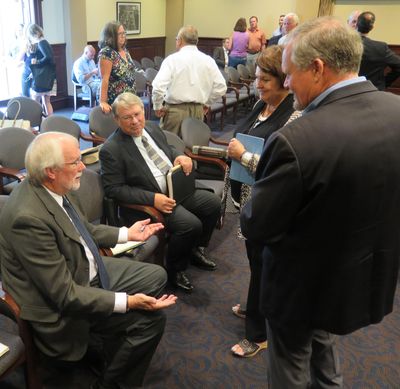Denney: OK to ‘buy’ a legislator, as long as it’s transparent

BOISE - Idaho Secretary of State Lawerence Denney told lawmakers Wednesday that if it were up to him, he’d be fine with no limits on campaign contributions, as long as all are quickly and fully reported.
“If some company wants to buy a legislator, from my point of view, that’s all right as long as I know who’s paying for that,” he said with a chuckle. He said courts have repeatedly said “that we can’t limit the First Amendment rights of people to say what they’re going to say, but we can require the reporting … we can require that transparency.”
Senate Minority Leader Michelle Stennett, D-Ketchum, sharply disagreed, telling Denney, “I wouldn’t want to go there,” and suggesting such a system could sanction corruption.
Sen. Todd Lakey, R-Nampa, said he, too, believes limits are appropriate.
The comments came as Denney addressed a working group of senators and representatives who are charged with recommending reforms to Idaho’s ethics and campaign finance laws. The panel held its first meeting Wednesday, and will meet again Aug. 28 to consider Denny’s slate of reform proposals.
Denney said he thinks Idaho’s Sunshine Law, passed by a voter initiative in 1974, needs some reforms to increase transparency in campaign finance reporting, from expanding reporting requirements to more candidates and elections, to requiring more frequent and up-to-date reporting. He’s also calling for more oversight of shadowy political action committees; and more enforcement tools, including stronger penalties.
“One of the frustrations we have is we are charged with enforcing the law, but we really don’t have any tools to do that, and the fine for violating the law is at $250,” Denney said. “What we typically do if we find a violation, or we think there’s a violation, we turn it over to the Attorney General, they do the investigation. But it’s pretty hard to get them to take a case for a $250 fine.”
Some lawmakers on the panel sparred over the nature of the problem, with Rep. John VanderWoude, R-Nampa, averring that no Idaho legislator can be bought.
VanderWoude, the Idaho House majority caucus chair, said, “I haven’t had a dime given to me that’s changed my mind,” said VanderWoude, who serves as Idaho House majority caucus chair. “A lot of people would like to change my mind, but money won’t do it.” He added, “I struggle with the premise that we can be bought and sold.”
Rep. Fred Wood, R-Burley, co-chairman of the legislative working group, disagreed. “That’s not the issue,” he said. “I think the whole issue is the public perception of what’s fair, and hiding money isn’t fair, and it never has been fair. And I think that’s the big issue.”
“Public perception is a different matter than how we perceive ourselves,” Wood said, “and I think we all need to be cognizant of that.”
Several lawmakers on the panel noted Idaho’s very low grades in national comparisons for its campaign finance and ethics laws – including its D-minus in the Center for Public Integrity’s State Integrity Investigation that examined all states’ laws and practices in 2015. Idaho is one of just three states with no financial disclosure requirements for state legislators – or any elected or appointed state official.
“Certainly there are reasons for financial disclosure,” Denney told the panel. “There are reasons that a lot of people don’t like financial disclosure. … Some of the things I’ve seen are very benign, and if they would help you to get that grade from a D-minus to a D-plus,” he said, it might be worth it.
The Idaho Senate unanimously passed a financial disclosure law in 2009, but it died without being assigned to a committee for a hearing in the House – when Denney, then speaker of the House, chose not to assign it.
The new legislative panel, which includes five senators and five representatives, has been charged with reviewing campaign finance and disclosure laws and ways to increase transparency, penalties, contribution limits, lobbyist disclosure requirements, applicability to recall campaigns and special elections, and two areas where Idaho has no requirements – “revolving door” rules and personal financial disclosure requirements. Revolving door rules prevent elected or appointed officials from moving straight into lobbying on the same issues on which they worked in government, without a waiting period.
Legislative leaders have asked the group to report back to lawmakers before the start of the 2018 legislative session with proposed changes to Idaho’s laws.
North Idaho Rep. Sage Dixon, R-Ponderay, said he’s new to the issue, and is “digesting” it. “I think we’re headed in a good direction,” he said. Dixon said he hopes the panel’s work will help “reassure the public that we’re not abusing our public positions or funding.”